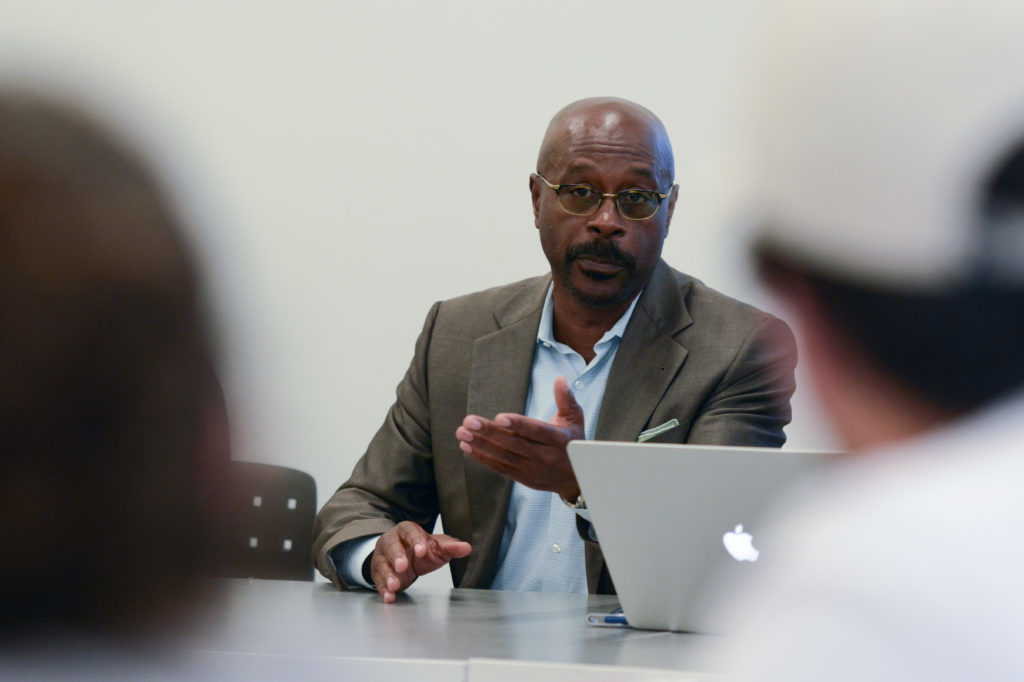Weeks after a mob of white nationalists marched through the University of Virginia, igniting chaos and violence, officials said they’re working to ensure GW isn’t next.
Safety officials said they have no plans to change the University’s protest policies – which already ban outside demonstrations on campus – after the violence in Charlottesville, but last week administrators invited about two dozen student organization leaders to a meeting outlining guidelines for campus protests after a series of riots over controversial speakers erupted on campuses nationwide.
At the meeting, officials detailed how groups can organize campus protests and how outside groups can obtain permission to protest on public property within University boundaries. Representatives from GW College Democrats, GW College Republicans and Greek life chapters attended the meeting.
As campuses increasingly become staging grounds for demonstrators on opposite ends of the political spectrum, experts specializing in campus safety said universities needed to communicate with student organizations and local and federal law enforcement to ensure their campuses are protected.
As an urban university located in the heart of the nation’s capitol, areas of public property surround GW’s campus is surrounded by areas of public property. This leaves potential for interaction between students and non-student protesters, Darrell Darnell, the senior associate vice president for safety and security, said.
Last month, during a white nationalist rally that took over Charlottesville, a man plowed his car through a crowd of counter protesters, killing one woman. The night before, torch-wielding demonstrators marched through the heart of the University of Virginia campus.
GW cannot regulate any demonstration that occurs on sidewalks or streets, but once protesters cross the campus line, the University Police Department can remove or bar them from campus property or arrest them, UPD Chief RaShall Brackney said in an interview.
To prevent violent protests, Brackney said UPD communicates with the Metropolitan Police Department and federal intelligence agencies to stay aware and monitor local events as they happen. Police officials also analyze areas of GW property deemed vulnerable and attempt to improve security in those areas.
“Having that information and understanding where there are concerns and fears allow us to help plan for those,” she said referring to potentially violent protests.
Outside demonstrators are required to apply for a permit with the city to gather in public spaces near GW buildings, but often those unfamiliar with GW cross onto University property accidentally, Brackney said.
Last spring there were rallies by anti-fascist, anti-transgender and homophobic groups on public spaces near University property, all within the span of a few weeks. All three groups faced backlash from either students or outside individuals.
Darnell said during the meeting Thursday that the University is preparing for hundreds of protesters traveling through campus during the pro-Trump “Mother of All Rallies” demonstration this weekend. He encouraged student leaders to continue their daily lives and not to confront demonstrators to avoid arrests and violence.
Organizers hope to gather one million people on the National Mall, according to the rally’s Facebook page.
Across the country, colleges have recently taken steps to limit controversial speakers from visiting campus.
The Young America’s Foundation canceled a speech by Ann Coulter, a conservative commentator, at University of California, Berkeley in April after a violent protest, and several universities, including Ohio State University, denied white nationalist Richard Spencer’s requests to speak on campuses, the Washington Post and WJLA reported.
In the past, riots have broken out at the University of California, Berkeley and Middlebury College during appearances by controversial speakers, like right-wing provocateur Milo Yiannopoulos and author Charles Murray.
At GW, officials conduct a security assessment for major speakers coming to campus and may run background checks on attendees, Darnell said. The assessments include an analysis of the event’s sponsor, the event planner, any outside agencies involved, the venue and the planned content of the event to gage the potential for violence, he said.
Peter Konwerski, the vice provost and dean of student affairs, said during the meeting that officials want to continue to bring controversial speakers from both sides to allow students to learn from differing opinions. Yiannopoulos spoke at a College Republicans event last October.
“We’re not looking to censor speakers,” he said in an interview. “We’re actually looking to create a kind of vibrant, dynamic environment where we have a diverse range of perspectives.”
During the meeting, officials told student leaders that the University allows students to protest as long as the demonstration does not disrupt University operations.
President Donald Trump’s election last November spawned a number of demonstrations across campus, including a class walk out.
Experts specializing in policing and campus safety said University police should work closely with city and state officials to plan protection for speakers, protesters and counter protesters.
After the events in Charlottesville, Gary Sigrist, CEO of Safeguard Risk Solutions, an emergency management organization, said his higher education clients are creating prevention plans that stress the importance of educating the student body about peaceful protests and non-violence.
“The University may put some restrictions and charge the group to hold the protest on the campus, it must be content neutral, meaning the restrictions and costs cannot be based solely on the group or the content of their message,” he said.
Brooke Migdon contributed reporting.




